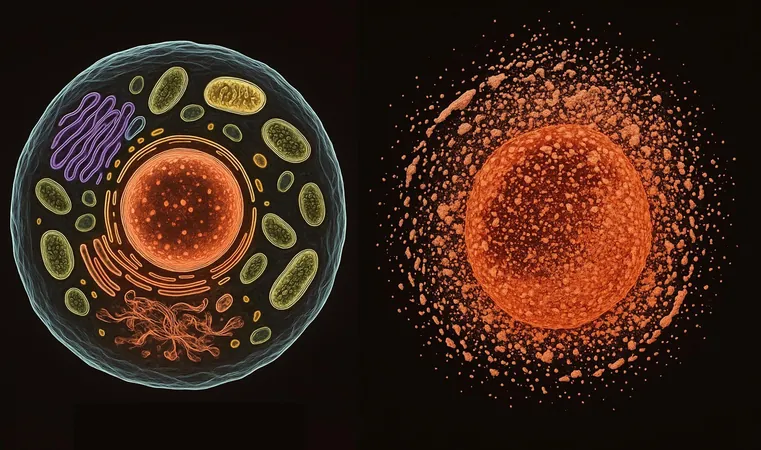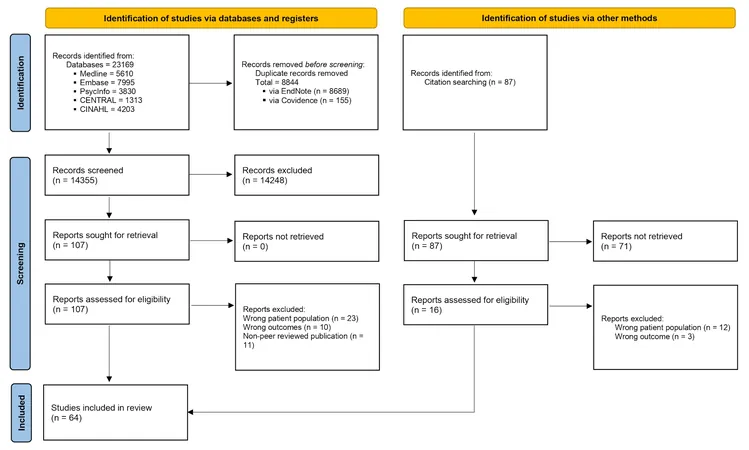
Is 'Pausing' Cell Death the Key to Revolutionizing Medicine on Earth and Beyond?
2025-05-29
Author: Jia
The Groundbreaking Potential of Pausing Necrosis
Imagine a world where experts could press pause on cell death—sounds like science fiction? Well, a new study from researchers at UCL, the drug discovery firm LinkGevity, and the European Space Agency (ESA) suggests it might be the ultimate breakthrough in medicine, capable of transforming human aging, disease management, and even space exploration.
Necrosis: A Hidden Driver of Aging
Published in the journal Oncogene, the study collectively presents a radical view: necrosis, often thought of as a mere endpoint in cell life, is actually a vital player in aging and disease processes. Scientists argue that by intervening in necrosis, we can change the course of various age-related conditions.
Dr. Keith Siew from UCL's Center for Kidney & Bladder Health notes that while death—particularly cell death—remains a taboo topic, understanding it is crucial. He wonders, "What if we could pause or completely halt necrosis?" Such a pause could mean not just longer life, but a more vibrant one.
Unlocking the Mysteries of Cell Death
Unlike the controlled, scheduled process of programmed cell death, necrosis is chaotic and destructive. It often occurs when cells die unexpectedly due to infections or injuries, leading to widespread inflammation and a cascade of negative effects on surrounding tissues. This chain reaction can set the stage for serious health issues, including chronic conditions like heart disease, kidney failure, and Alzheimer's.
Calcium plays a pivotal role in cell function and death. Normally present in higher concentrations outside the cell, a failure in balance can trigger necrosis, causing cells to burst open and release toxic substances.
The Deceptive Nature of Necrosis
Dr. Kern, CEO of LinkGevity, emphasizes that necrosis has been historically underrated in medicine. Labelled the last frontier, it extends across all fields relevant to aging and disease—making it a significant target for medical breakthroughs.
She states, "If we could target necrosis, we could open up new avenues for treating numerous conditions, from kidney failure to neurodegeneration." Acknowledging the considerable toll necrosis takes, especially on kidney health, only half of adults over 75 escape some form of kidney disease as they age.
Implications for Health and Space Exploration
In space, the stakes are even higher. Astronauts confront accelerated aging and health decline due to the harsh realities of low gravity and cosmic radiation. A 2024 study led by Dr. Siew highlighted the kidneys as potential weak links during long-term space missions.
Professor Damian Bailey, an ESA Life Sciences Working Group chair, points out that tackling necrosis could not only change the trajectory of aging on Earth but advance human exploration into the cosmos. In space, degenerative conditions are exacerbated, making solutions even more critical.
The Future of Regenerative Medicine?
Dr. Kern adds compellingly, "In the realm of age-related diseases affecting essential organs, relentless waves of necrosis drive progression. If we could prevent necrosis, even temporarily, we'd disrupt these destructive patterns, enabling healing, cell renewal, and possibly even regeneration."




 Brasil (PT)
Brasil (PT)
 Canada (EN)
Canada (EN)
 Chile (ES)
Chile (ES)
 Česko (CS)
Česko (CS)
 대한민국 (KO)
대한민국 (KO)
 España (ES)
España (ES)
 France (FR)
France (FR)
 Hong Kong (EN)
Hong Kong (EN)
 Italia (IT)
Italia (IT)
 日本 (JA)
日本 (JA)
 Magyarország (HU)
Magyarország (HU)
 Norge (NO)
Norge (NO)
 Polska (PL)
Polska (PL)
 Schweiz (DE)
Schweiz (DE)
 Singapore (EN)
Singapore (EN)
 Sverige (SV)
Sverige (SV)
 Suomi (FI)
Suomi (FI)
 Türkiye (TR)
Türkiye (TR)
 الإمارات العربية المتحدة (AR)
الإمارات العربية المتحدة (AR)